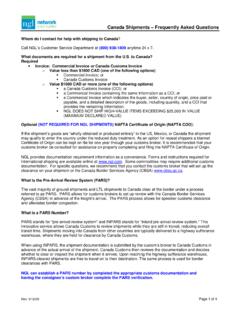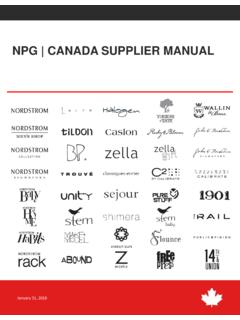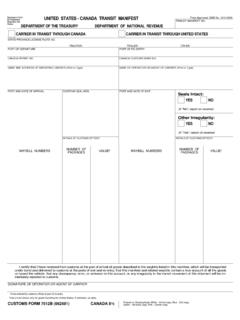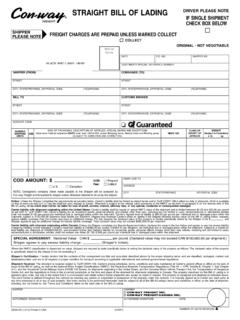Transcription of FIREARM USERS VISITING CANADA - …
1 FIREARM USERS VISITING CANADA . BRINGING FIREARMS INTO CANADA 2013 Edition: Here is some basic information about bringing a FIREARM , or other items regulated by the Firearms Act, into CANADA . The Firearms Act is a federal law and therefore applies across the country. Provinces and territories may have additional requirements, especially with respect to hunting. An individual must be at least 18 years old to bring a FIREARM into CANADA . Those younger than 18 may use a FIREARM in certain circumstances, but an adult must remain present and responsible for the FIREARM . Classes of Firearms and Devices: There are three classes of firearms in CANADA : Non-restricted (most common rifles and shotguns): These may generally be imported for purposes such as hunting, protection from wild animals in remote wilderness areas where firearms are allowed, or target shooting.
2 They may also be taken in transit through CANADA by a reasonably direct route. Restricted: (longer-barreled handguns, some types of long guns) these are allowed for certain purposes, such as target shooting at an approved club or range, but they are not allowed for hunting or self protection. Prohibited: (shorter-barreled handguns, automatic weapons) these cannot be brought into CANADA . Some firearms are classified as restricted or prohibited under the Criminal Code based on their general characteristics ( barrel length or caliber) Other restricted and prohibited firearms are specified by name in Criminal Code Regulations. Some large capacity magazines are prohibited even if the firearms to which the magazines are attached are allowed.
3 As a general rule, the maximum capacity is: Five cartridges for most magazines designed for a centre fire semiautomatic long gun and ten cartridges for most handgun magazines. There is no maximum magazine capacity for other types of long guns, including Semi-automatics that discharge only rim-fire ammunition. Licensing and Registration Requirements: FIREARM owner and USERS in CANADA need a valid firearms licence allowing them to possess firearms in their possession. A. licence issued under CANADA ' sFirearms Act is different from a provincial hunting licence. Visit the RCMP web page: for their information bulletin and necessary RCMP 5589/CAFC 909.
4 Form. This RCMP outlines the procedures to bring firearms into CANADA for shooting competitions. CANADA has rules for bringing firearms into CANADA by out-of-country shooting competitors. NON-RESIDENTS have two options for meeting the Canadian licensing requirements: 1. HOW TO BRING NON-RESTRICTED (LONG GUNS) FIREARMS INTO CANADA . Option 1: Prior to leaving home, complete RCMP 5589/CAFC 909 in three copies, but do not sign it. If you have more than three firearms, also complete, in three copies, the Form RCMP 5590/CAFC 910, and attach it to your Form RCMP 5589/CAFC. 909. Bring your Invitationt ot heMat ch'mailed to you upon match entry, or contact the BCRA Secretary to get one.
5 Use the appropriate invitation for the match entered. Declare firearms in writing to a customs officer at the point of entry to CANADA , using the Non-Resident FIREARM Declaration (form RCMP 5589 / CAFC - 909). If there are more than three firearms, a Non-Resident FIREARM Declaration Continuation Sheet (form RCMP 5590/ CAFC - 910) should be added. The declaration form should be filled out prior to arrival at the point of entry, in order to save time. However, it should not be signed before arriving at the entry point, as a CANADA Border Services Agency (CBSA) customs officer must witness the signature. A confirmed declaration costs a flat fee of $25, regardless of the number of firearms listed on it.
6 It is valid only for the person who signs it and only for those firearms listed on the declaration. Once the declaration has been confirmed by the CBSA customs officer, it acts as a licence for the owner and it is valid for 60 days. The declaration can be renewed for free, providing it is renewed before it expires, by contacting the Chief Firearms Officer (call 1-800-731-4000) of the relevant province or territory. Option 2. Apply for a five-year Possession and Acquisition Licence (PAL). To apply for a PAL, applicants must provide evidence that they have passed the written and practical tests for the Canadian Firearms Safety Course.
7 A course from another country does not meet Canadian legal requirements. However, it may be possible to take the tests without taking the course. The CFO of the province or territory to be visited can provide information on any other documents that will be required to complete the background security check. With a Canadian firearms licence, there is no need to complete the Non-Resident Firearms Declaration. However, an oral declaration must still be made to the customs officer. These procedures have worked well for the US Competitors at the Canadian border- crossings and Overseas Competitors at the Vancouver International Airport the last nine years.
8 No one has been turned away to date. 2. TO BRING RESTRICTED FIREARMS INTO BRITISH COLUMBIA, CANADA . For information on VISITING CANADA with restricted firearms, contact the Royal Canadian Mounted Police Canadian Firearms Program (CFP). Additional requirements must be met before a restricted FIREARM can be brought into CANADA . 3. YOU MAY NOT BRING A PROHIBITED FIREARM INTO CANADA . THEY WILL BE SEIZED BY. CANADA BORDER SERVICES AGENCY (CBSA). 4. LASTLY: The RCMP 5589/CAFC 909 and RCMP 5590/CAFC 910 Form is retained by you upon leaving CANADA , in case you want to re-new it free of charge up to 60 days prior to the expiry date of the present signed form for competition or hunting in CANADA .
9 Remember to have an US Certificate of Registration Form 4457 for your rifles on return to the USA. You can get your Form 4457 at a US Border Protection Office near you or have one issued at the US Border Protection Office just prior to entering CANADA at the border crossing. US Border Protection at the US Border Crossing will require it for your re-entry to US. US Border Protection requires a valid US passport for ALL US citizens to re-enter the US effective 1 June, 2009. Most US shooters have passports as we are shooting regularly in other countries, but for those who do not posses a valid US passport, perhaps you should consider applying for a US passport now.
10 If for any reason you encounter any problems with Canadian Border Service Agency (CBSA), please note all of the details including the badge number of the Customs Officer(s) and event times. Contact the CFONR or CFOBC directly by phone and also advise the BCRA so the problems can be resolved. Please do not be discouraged by these procedures. Your participation is very important to the BCRA as we encourage International shooting competitions. Your participation in our matches offers you an excellent training program. We look forward to sharing a target with you in 2013. Pitcairn, BCRA Secretary CANADIAN FIREARMS CENTRE 1-800-731-4000: 7 days - 24 hours.





